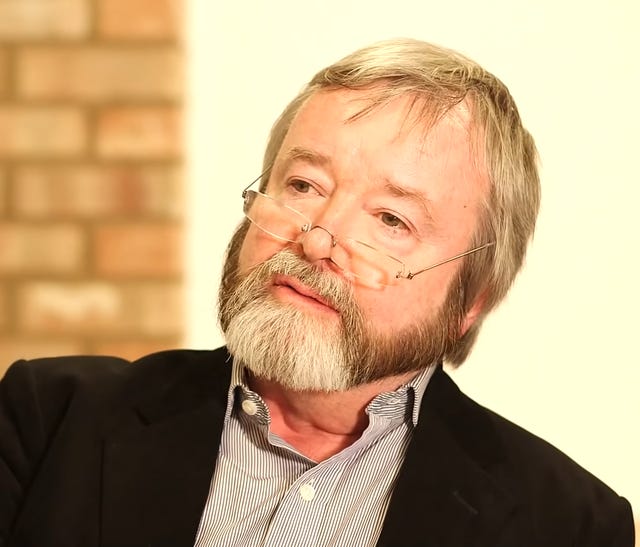1. Two more lengthy recorded conversations will be arriving on this site in the next couple weeks: one a three-party exchange including the novelist, editor, and political theorist China Miéville (in a return appearance) and his friend, fellow editor, and “comrade” Richard Seymour, writer, theorist, essayist, cultural critic; the other a discussion with Iain McGilchrist, psychiatrist, neurologist, writer, philosopher of consciousness, cultural critic.... Both conversations were, to my mind, almost indecently rich. After posting the second of them, however, I shall in all likelihood be taking a break from these recordings, in order to devote a few months to conferences, lectures, and books to which I am committed and for which the deadlines are drawing rapidly nigh. During the hiatus, I shall try to think about which friends, acquaintances, or co-conspirators to conscript into the project. Feel free to recommend topics.
2. I thought I might call attention to a book scheduled to appear this coming May 2nd: Natality: Toward a Philosophy of Birth, by Jennifer Banks, from W.W. Norton & Co. In this volume, Banks—whom until now I have known chiefly as my indispensable editor at Yale University Press—addresses what I think it fair to call a conspicuous oversight in most of our philosophical reflections on what constitutes human nature and the human condition: to wit, childbirth. Certainly, philosophers, divines, theorists of every kind have traditionally undertaken enormous consideration of our common lot as mortals, but only a very few have devoted much sustained reflection to the experience of conceiving, gestating, bearing, and nurturing new human life as defining our essence. No doubt, part of that lies in which of the two sexes possesses the more direct knowledge and understanding of that particular dimension of our existence—which is to say, the one that, as a rule, has not enjoyed the privilege of making large pronouncements on human nature. Anyway, Banks takes up a slightly subversive current of thought, concerning what Hannah Arendt called “natality”; and she does so in conversation, so to speak, with Arendt, but also with Mary Wollstonecraft, Mary Shelley, Adrienne Rich, Sojourner Truth, Toni Morrison, and even (a little unexpectedly) Friedrich Nietzsche. It really is a fascinating extended essay, and very illuminating (especially, perhaps, for male readers).
3. I had better say this here, in order to curtail further inquiries. I have been asked by about a dozen persons whether I intend to write some sort of critique of an article that appeared on April 14th in Notre Dame’s Church Life Journal, written by Eleonore Stump, defending the idea of a hell of eternal torment for the derelict. I do not. Even if I felt some great urge to do so, there really would be no need, since the article is merely a rehearsal of arguments that have been made many, many, many times before, all of which I believe I already addressed more than adequately in That All Shall Be Saved, and all of which have been refuted fairly thoroughly and fairly often by quite a few other authors. And Stump adds nothing new to any of them. In fact, her article’s chief distinction is its absence of any real distinction. Everything about it is boringly conventional—the bland assumptions regarding the justice of eternal punishment, the empirically false claims regarding the range of human freedom, the arbitrary constraints placed upon God’s omnipotence and moral discretion in order to make it seem as if there really is no choice on his part but to damn countless souls to endless torment… (and so forth). Basically, it is a rote recitation of the “free will defense” of eternal hell (which is so often presented as a traditional Christian teaching, but which in fact entered Christian reflection only in the twentieth century as a last desperate attempt to rescue the doctrine of hell from its own moral unintelligibility) scaffolded within a hard and fast distinction between God’s antecedent and consequent wills (which genuinely is an antique theologoumenon, albeit a conceptually vapid one). My only real comment on the matter is that it continues to baffle me that anyone could imagine such claims offer any explanations even remotely commensurate to the moral scandal that the doctrine of hell presents. I do not care about Stump’s arguments; we have all heard them many times before, and they remain essentially silly. But therein lies a depressing truth. Stump is not stupid, and neither are many others who have made the same claims. Once, though, one has made oneself accept a ridiculous premise, one has little choice but to try to devise rationalizations that, within the embrace of that absurdity, seem somehow rigorous and reasonable. And one does this, in most cases, in perfectly good faith. But that does not oblige the rest of us to treat those rationalizations with respect. This entire issue of eternal damnation, no matter how intense the existential anxiety it provokes, is objectively ludicrous. There is no way in which the traditional doctrine of eternal hell can be defended either logically or morally; it is sheer moral insanity allied to sheer dialectical incoherence, and absolutely nothing else. It could be true in no possible world, and every argument in its defense, viewed impartially, is risible at best, monstrous at worst. The only reason that a good number of bright and good persons attempt so ardently to make themselves and others believe it to be true is that they have been conditioned by misplaced piety and unresolved emotional abuse to think they must. And, so long as they remain in thrall to that conditioning, they can convince themselves that it all makes eminent good sense. Conversely, however, one need only set terror and superstition aside long enough to confront the teaching lucidly and honestly, in the full range of its implications, to discover all at once just how incoherent and evil it is. Once the trance is broken, the whole intricate structure of rationalizations collapses into the abyss of absurdity underlying it. Thereafter, it becomes impossible ever again to take the idea of an eternal hell seriously, or to be impressed by very old and very bad arguments in its favor.






I do think Stump's article added one thing I hadn't quite heard before: the breathtakingly clear affirmation that not only is the distinction between God's antecedent and consequent will logically coherent (it isn't), but that it is so much the deepest truth of God's being that the division it introduces produces precise contradictories: antecedently He'd be struck by the pangs of disappointment at poor Jerome's making of himself a Nazi, but consequently He'd be more or less undisturbed at the same prospect. And then there's the added confusion that there lurks in Jerome a power so invincible that it can make Jerome's "true self," whom God knows infallibly, into a "mere figment" for God himself. Apparently God must contend with preexistent matter after all. Only here it's called "free will."
Would love to hear you and John Behr in conversation.